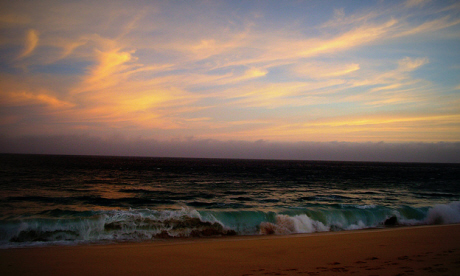
Rob Crossan pays a visit to the world's smallest independent republic as it tries to get itself out of one of the world's biggest economic pickles
You shouldn’t worry too much if you haven’t heard of Nauru – virtually nobody else has either. But look a little further into the story of this remote island and a feast of incredible statistics comes forth.
This lump of rock in the middle of the Pacific Ocean is the smallest independent republic in the world.
It is the only country so small it does not even have a capital. According to recent medical reports, it is the most obese nation on earth. Not only that, but this now desperately poor land was, at one stage in the 1970s, the richest in the world.
With these statistics, it is incredible that this speck of land has languished in obscurity for so long. Now Nauru needs help badly, and its quite exceptional tale is beginning to be told.
The story of Nauru is dominated by bird shit – guano, to be precise. Over thousands of years, the accumulated droppings of seabirds created a vast reservoir of phosphate, a vital fertiliser and an extremely valuable export. The British, the Australians, then – following independence in 1968 – the Nauruans themselves have been mining the island’s phosphate mercilessly for almost 100 years.
Now the centre of the island – known to the locals as ‘Topside’, and covering 85% of Nauru – is a landscape of mined-out devastation that looks like nowhere else on earth. Huge coral pinnacles reach into the horizon looking like fossilised pawns in the world’s biggest game of chess. Vegetation grows in the areas mined decades ago, a testament to the awe-some regenerative powers of nature.
The phosphate years were a boon beyond compare for the 13,000 inhabitants of Nauru. With the vast majority of the population owning land, all they had to do was sit back while it was mined, collect money (in cash) from the government building every month, and spend their time chartering flights to Fiji and Australia, importing 4WDs and junk food, playing golf and driving around the single island road in various stages of inebriation.
Traditional island culture and skills died out completely in the face of rampant consumerism. Musicals in London funded by the government closed after a week, Russian mafia money started pouring into shell banks based at the island’s post office, property was acquired across the world and then left to rot.
It was only when, around ten years ago, the weekly cash payments started to get delayed, reduced and then stopped completely, that the true scale of Nauru’s epic waste of fortune came to light. The phosphate was running out.
Now the people of Nauru live a very different life, as they begin a course of the toughest economic belt-tightening imaginable.
Amid all this upheaval there is a new government, led by the improbably named Ludwig Scotty. In a bid to encourage his people to live more frugally, President Ludwig lives with his wife in a converted outhouse.
“There have been stories going around for many years that we will have to abandon the island and go elsewhere,” Ludwig tells me. “But if you speak to the people you know that this will never happen. No matter what state this country is in, you will not find anybody who wants to leave. This is our home and we have many plans as to how Nauru can recover.”
These plans, as it transpires, include the notion of excavating a second layer of phosphate from the land. Initial tests have proved promising though the costs of getting at this legendarily difficult-to-extract material will be astronomical.
When I press Ludwig about the island’s potential for tourism he jumps to attention: “Fishing here is excellent, the people are wonderfully friendly and the sight of the phosphate ruins is one of the most incredible things that you will ever see!”
The atmosphere on Nauru is still quite unbelievably optimistic, but tempered with anger over what previous governments have done with all the money. As Ludwig Scotty himself tells me: “This country is still in intensive care, but until a year or so ago we were in a coma.”
If the government’s drive to attract visitors continues, it won’t be long before many more people wake up to the story of the island that, although no longer the richest, is still the smallest and one of the remotest nations in the world.